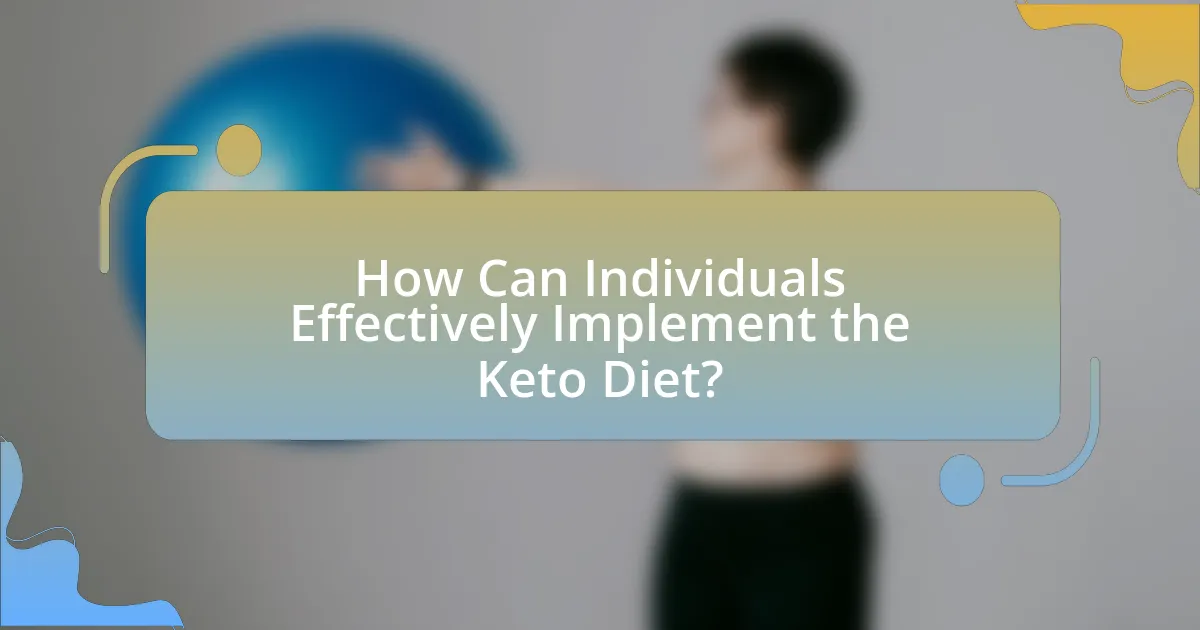The article explores the rising popularity of the Keto Diet, a high-fat, low-carbohydrate dietary regimen that induces ketosis, leading to fat burning for energy. It discusses the diet’s mechanisms, key components, and potential benefits, including weight loss and improved metabolic health. Insights from recent health expos reveal trends in Keto products, expert opinions on sustainability, and practical tips for individuals looking to implement the diet effectively. Additionally, the article highlights common mistakes to avoid and resources available for ongoing support in the Keto journey.

What is the Keto Diet and Why is it Popular?
The Keto Diet is a high-fat, low-carbohydrate dietary regimen designed to induce ketosis, a metabolic state where the body burns fat for fuel instead of carbohydrates. Its popularity stems from its potential for rapid weight loss, appetite suppression, and improved energy levels, which many individuals find appealing. Research indicates that the Keto Diet can lead to significant weight loss; a study published in the Journal of Clinical Endocrinology & Metabolism found that participants on a ketogenic diet lost more weight than those on a low-fat diet over a 24-week period. Additionally, the diet has gained traction due to endorsements from celebrities and influencers, further fueling public interest.
How does the Keto Diet work?
The Keto Diet works by inducing a state of ketosis in the body, where fat is used as the primary source of energy instead of carbohydrates. This is achieved by significantly reducing carbohydrate intake to about 5-10% of total daily calories, while increasing fat intake to approximately 70-75% and maintaining moderate protein intake at around 20%. When carbohydrate levels are low, the liver converts fatty acids into ketones, which serve as an alternative fuel source for the brain and body. Research indicates that this metabolic shift can lead to weight loss, improved blood sugar control, and enhanced mental clarity, as evidenced by studies such as the one published in the “Journal of Nutrition” by Paoli et al., which highlights the diet’s effectiveness in promoting fat loss and improving metabolic health.
What are the key components of the Keto Diet?
The key components of the Keto Diet are high fat intake, moderate protein consumption, and very low carbohydrate restriction. This dietary approach typically consists of approximately 70-75% of daily calories from fats, 20-25% from proteins, and only about 5-10% from carbohydrates. The primary goal of the Keto Diet is to induce a state of ketosis, where the body burns fat for fuel instead of carbohydrates. Research indicates that this metabolic state can lead to weight loss and improved blood sugar control, as evidenced by a study published in the “Journal of Clinical Endocrinology & Metabolism” by Westman et al., which demonstrated significant weight loss and metabolic improvements in participants following a ketogenic diet.
How does the body respond to a ketogenic state?
The body responds to a ketogenic state by shifting its primary energy source from carbohydrates to fats, leading to the production of ketones. This metabolic adaptation occurs when carbohydrate intake is significantly reduced, prompting the liver to convert fatty acids into ketones, which serve as an alternative fuel for various tissues, including the brain. Research indicates that this state can enhance fat oxidation, improve insulin sensitivity, and may lead to weight loss, as evidenced by studies showing that individuals on ketogenic diets often experience reduced hunger and increased fat loss compared to those on higher carbohydrate diets.
What are the potential benefits of the Keto Diet?
The potential benefits of the Keto Diet include weight loss, improved blood sugar control, and enhanced mental clarity. Research indicates that the ketogenic diet can lead to significant weight reduction due to its low carbohydrate intake, which promotes fat burning for energy. A study published in the Journal of Clinical Endocrinology & Metabolism found that participants on a ketogenic diet experienced greater weight loss compared to those on a low-fat diet. Additionally, the Keto Diet has been shown to stabilize blood sugar levels, which can be particularly beneficial for individuals with type 2 diabetes, as evidenced by findings in the journal Diabetes Therapy. Furthermore, many adherents report increased mental clarity and focus, likely due to the brain’s preference for ketones as an energy source, supported by research in the journal Neurobiology of Aging.
How can the Keto Diet aid in weight loss?
The Keto Diet aids in weight loss by inducing a state of ketosis, where the body burns fat for fuel instead of carbohydrates. This metabolic shift occurs when carbohydrate intake is significantly reduced, typically to less than 50 grams per day, leading to decreased insulin levels and increased fat oxidation. Research published in the “Journal of Clinical Endocrinology & Metabolism” indicates that individuals following a ketogenic diet can experience greater weight loss compared to those on low-fat diets, primarily due to enhanced fat burning and appetite suppression.
What health conditions may benefit from the Keto Diet?
The Keto Diet may benefit several health conditions, including epilepsy, type 2 diabetes, obesity, and metabolic syndrome. Research indicates that the ketogenic diet is particularly effective in reducing seizure frequency in individuals with epilepsy, especially in drug-resistant cases, as demonstrated in a study published in the journal “Epilepsia” by Freeman et al. (2007). Additionally, the diet can improve glycemic control and promote weight loss in type 2 diabetes and obesity, as shown in a systematic review in “Nutrition & Metabolism” by Hu et al. (2016). Furthermore, the Keto Diet may aid in managing metabolic syndrome by improving lipid profiles and insulin sensitivity, supported by findings in the “Journal of Clinical Endocrinology & Metabolism” by Paoli et al. (2013).

What Insights Have Recent Health Expos Provided on the Keto Craze?
Recent health expos have highlighted that the keto diet is gaining popularity due to its potential for weight loss and improved metabolic health. Attendees reported increased interest in low-carb, high-fat foods, with many vendors showcasing keto-friendly products, indicating a growing market demand. Additionally, expert speakers at these expos emphasized the importance of understanding individual dietary needs and the potential long-term effects of the keto diet, such as nutrient deficiencies. Surveys conducted at these events revealed that a significant percentage of participants are adopting the keto lifestyle, reflecting a shift in dietary trends towards low-carb diets.
What trends in Keto products were highlighted at health expos?
Recent health expos highlighted several key trends in Keto products, including the rise of plant-based Keto options, innovative snack alternatives, and enhanced functional ingredients. Plant-based Keto products, such as nut-based cheeses and protein bars, cater to the growing demand for vegan diets while maintaining low carbohydrate content. Innovative snacks, like Keto-friendly chips and cookies, have gained popularity, reflecting consumer interest in convenient, on-the-go options. Additionally, products featuring functional ingredients, such as MCT oil and collagen, emphasize health benefits beyond macronutrient profiles, appealing to health-conscious consumers. These trends indicate a shift towards more diverse and health-oriented Keto offerings in the market.
Which new Keto-friendly foods were showcased?
New Keto-friendly foods showcased include cauliflower rice, almond flour snacks, and coconut yogurt. These items were highlighted for their low carbohydrate content, making them suitable for ketogenic diets. Cauliflower rice serves as a low-carb substitute for traditional grains, while almond flour snacks provide a gluten-free option with healthy fats. Coconut yogurt offers a dairy-free alternative rich in probiotics, aligning with Keto dietary principles.
How are companies innovating within the Keto space?
Companies are innovating within the Keto space by developing a diverse range of products that cater to evolving consumer preferences and dietary needs. For instance, brands are introducing keto-friendly snacks, meal kits, and ready-to-eat meals that utilize high-quality fats and low-carb ingredients, making it easier for consumers to adhere to the ketogenic diet. Additionally, advancements in food technology have led to the creation of plant-based keto options, appealing to a broader audience, including vegetarians and vegans. Market research indicates that the global ketogenic diet market is projected to reach $15.6 billion by 2027, highlighting the growing demand for innovative keto products.
What expert opinions emerged from health expos regarding the Keto Diet?
Experts at health expos have expressed a range of opinions regarding the Keto Diet, emphasizing its potential benefits and risks. Many nutritionists highlighted that the Keto Diet can lead to significant weight loss and improved metabolic health due to its low carbohydrate intake, which encourages the body to burn fat for fuel. However, some health professionals cautioned against long-term adherence to the diet, citing concerns about nutrient deficiencies and the potential for increased cholesterol levels. Research presented at these expos, such as findings from the Journal of Nutrition, indicated that while short-term results can be promising, the sustainability and long-term health effects of the Keto Diet require further investigation.
What do nutritionists say about the sustainability of the Keto Diet?
Nutritionists generally express concerns about the sustainability of the Keto Diet due to its restrictive nature and potential long-term health implications. Many experts highlight that the diet’s high fat and low carbohydrate intake can lead to nutrient deficiencies, as it limits the consumption of fruits, vegetables, and whole grains. Research published in the Journal of the American College of Nutrition indicates that while short-term weight loss can be achieved, the long-term adherence to such a restrictive diet is challenging for many individuals, leading to a higher likelihood of regaining weight. Additionally, nutritionists emphasize the importance of a balanced diet for overall health, which the Keto Diet may not provide in the long run.
How do health professionals view the long-term effects of Keto?
Health professionals generally express caution regarding the long-term effects of the ketogenic diet. Many experts highlight potential risks such as nutrient deficiencies, liver health issues, and increased cholesterol levels. For instance, a review published in the Journal of the American College of Cardiology indicates that while short-term weight loss can be significant, the long-term sustainability and health impacts remain uncertain, with some studies linking prolonged adherence to adverse cardiovascular outcomes. Additionally, the Academy of Nutrition and Dietetics emphasizes the importance of a balanced diet, suggesting that extreme dietary restrictions may not be suitable for everyone and could lead to negative health consequences over time.

How Can Individuals Effectively Implement the Keto Diet?
Individuals can effectively implement the Keto diet by significantly reducing carbohydrate intake while increasing fat consumption to achieve a state of ketosis. This involves planning meals that consist primarily of high-fat foods such as avocados, nuts, seeds, and oils, while limiting foods high in carbohydrates like bread, pasta, and sugary snacks. Research indicates that a well-structured Keto diet can lead to weight loss and improved metabolic health, as evidenced by a study published in the “Journal of Nutrition” by Paoli et al., which found that participants on a ketogenic diet experienced greater fat loss compared to those on a standard diet. Additionally, tracking macronutrient intake using apps can help individuals stay within their target ratios, ensuring they maintain ketosis effectively.
What practical tips can help beginners start the Keto Diet?
To start the Keto Diet effectively, beginners should focus on meal planning, tracking macronutrients, and staying hydrated. Meal planning helps ensure that meals are low in carbohydrates and high in healthy fats, which is essential for entering ketosis. Tracking macronutrients allows beginners to maintain the appropriate ratio of fats, proteins, and carbohydrates, typically around 70% fats, 25% proteins, and 5% carbohydrates. Staying hydrated is crucial as the body may lose water weight initially, and adequate hydration can help mitigate symptoms of the “keto flu.” These strategies are supported by numerous resources, including the “Keto Diet for Beginners” guide, which emphasizes the importance of preparation and awareness in achieving dietary goals.
How can meal planning support a successful Keto lifestyle?
Meal planning supports a successful Keto lifestyle by ensuring that individuals consistently consume low-carbohydrate, high-fat meals that align with Keto dietary guidelines. This structured approach helps prevent unintentional carbohydrate intake, which can disrupt ketosis, the metabolic state essential for the Keto diet’s effectiveness. Research indicates that meal planning can lead to better adherence to dietary goals, as it reduces impulsive eating and enhances nutritional awareness. A study published in the Journal of Nutrition found that individuals who engaged in meal planning were more likely to meet their dietary targets and maintain weight loss compared to those who did not plan their meals.
What common mistakes should be avoided when starting Keto?
Common mistakes to avoid when starting Keto include not tracking macronutrient intake, neglecting hydration, and underestimating the importance of electrolytes. Failing to track macronutrients can lead to excessive carbohydrate consumption, which hinders ketosis; studies show that maintaining a carbohydrate intake below 20-50 grams per day is crucial for achieving ketosis. Neglecting hydration can result in symptoms of the “keto flu,” as the body excretes more water and electrolytes during the initial phase of the diet. Additionally, not replenishing electrolytes like sodium, potassium, and magnesium can lead to imbalances, causing fatigue and muscle cramps. These mistakes can significantly impact the effectiveness of the Keto diet and overall health outcomes.
What resources are available for ongoing Keto support?
Ongoing Keto support resources include online communities, mobile apps, and educational websites. Online communities such as Reddit’s r/keto provide peer support and shared experiences, while mobile apps like Carb Manager and MyFitnessPal help track macronutrients and meal planning. Educational websites, including Diet Doctor and Keto Connect, offer recipes, articles, and guides to enhance understanding of the ketogenic diet. These resources are validated by their popularity and user engagement, demonstrating their effectiveness in supporting individuals on the Keto journey.
How can online communities assist in the Keto journey?
Online communities can significantly assist individuals on the Keto journey by providing support, sharing resources, and fostering accountability. These platforms enable members to exchange recipes, meal plans, and tips tailored to the ketogenic diet, which can enhance adherence and success rates. Research indicates that social support is crucial for dietary changes; a study published in the Journal of Nutrition Education and Behavior found that individuals who engaged with online communities were more likely to maintain their dietary goals. Additionally, these communities often host challenges and discussions that motivate participants, creating a sense of belonging and shared purpose that can lead to better outcomes in the Keto lifestyle.
What are some recommended apps for tracking Keto progress?
Some recommended apps for tracking Keto progress include MyFitnessPal, Carb Manager, and Cronometer. MyFitnessPal allows users to log food intake and track macronutrients, making it easier to adhere to a ketogenic diet. Carb Manager specializes in tracking carbohydrate intake and offers a comprehensive database of keto-friendly foods. Cronometer provides detailed nutritional information and helps users monitor their micronutrient intake, which is crucial for maintaining health on a keto diet. These apps are widely used and have received positive reviews for their effectiveness in supporting individuals on their keto journey.





